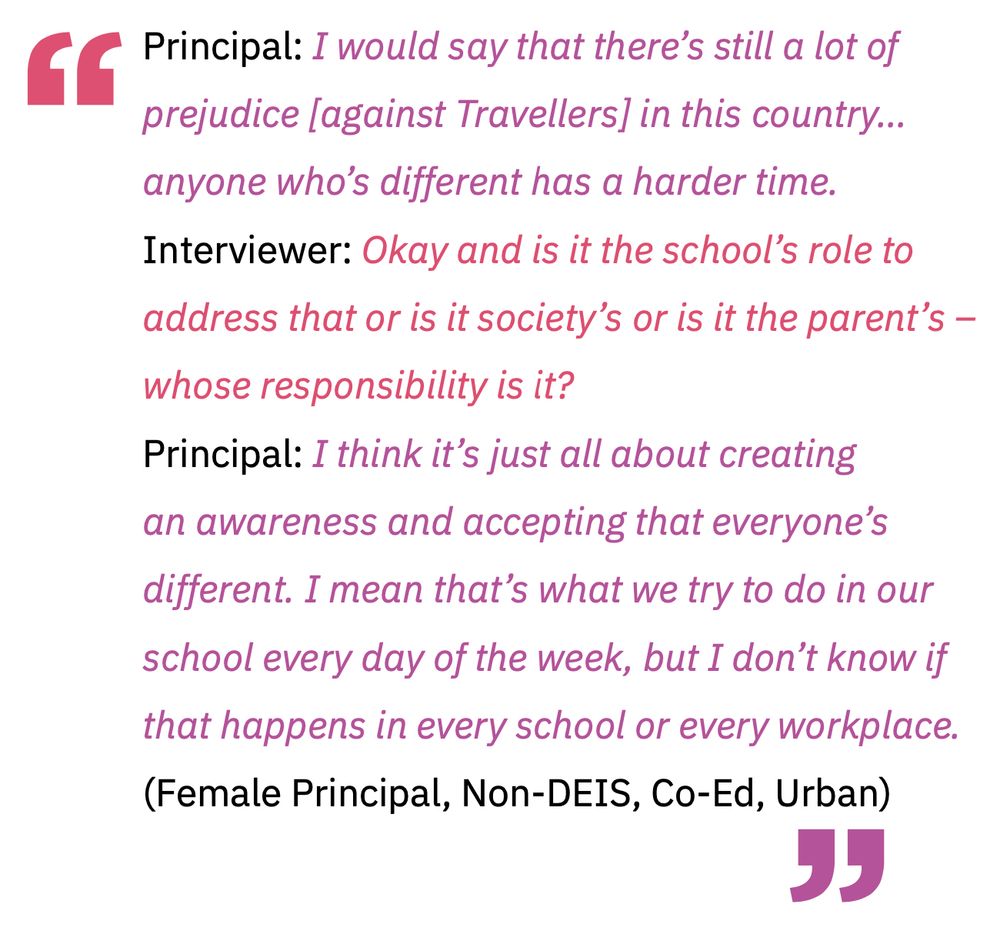Home | CSL
Home | CSL
🔗 Learn more about #CSLstudy at: cslstudy.ie
@dympnadevine.bsky.social @gmsainz.bsky.social @seaneens.bsky.social @seangleasure.bsky.social @ucddublin.bsky.social @ucdresearch.bsky.social
18/18
03.09.2025 07:24 —
👍 0
🔁 0
💬 0
📌 0

✨Children in 1st Year were asked about the advice they would offer to children who are preparing for the transition. The overwhelming theme was one of encouragement, emphasising that the transition to post-primary school was not as bad as they worried it would be.
⬇️ 17/18
03.09.2025 07:24 —
👍 0
🔁 0
💬 1
📌 0

👉 Both 1st Year children and their parents found 6th Class preparations, open days, and mentoring from senior students at post-primary level helpful for the transition.
⬇️ 16/18
03.09.2025 07:24 —
👍 0
🔁 0
💬 1
📌 0


📃Interviews with teachers confirmed that school transition programmes, for example, external visits by post primary school representatives, as well as handovers between primary and post-primary schools were key support measures.
⬇️ 15/18
03.09.2025 07:24 —
👍 0
🔁 0
💬 1
📌 0


📝 Overall, parents felt that tests are not stressful for their 1st Year children, with over half agreeing the testing climate in their new post-primary schools is healthy. However, one third were uncertain.
⬇️ 14/18
03.09.2025 07:24 —
👍 0
🔁 0
💬 1
📌 0


⭐ Children reported high rating to the following aspects of their school lives in 1st Year which aligned with their perceptions in 6th Class:
- the level of academic support provided by their new post-primary teachers; and
- their own academic self-concept.
⬇️ 13/18
03.09.2025 07:24 —
👍 0
🔁 0
💬 1
📌 0


Interviews with children about their experiences in 1st Year confirmed their happiness and satisfaction with the transfer, in spite of an initial period of unsettlement. Of note is their appreciation of new opportunities, growing independence and maturity.
⬇️ 12/18
03.09.2025 07:24 —
👍 0
🔁 0
💬 1
📌 0

💭Children in 1st Year were more likely to agree that their voice is heard, as compared to 6th Class. They reported higher levels of being allowed to make decisions, having their ideas used to change things, and feeling listened to in their 1st Year.
⬇️11/18
03.09.2025 07:24 —
👍 0
🔁 0
💬 1
📌 0

While children’s sense of belonging at school is likely in a delicate state of flux as they transition to a new school; results show that children had an increased feeling of belonging during their first term of 1st Year (80%) as compared to 6th Class (48%).
⬇️ 10/18
03.09.2025 07:24 —
👍 1
🔁 0
💬 1
📌 0

When asked about the links between their school work and their future career, there was an increase in how relevant children felt their current learning was. Those in 1st Year rated the relevance of what they are learning in class higher than they did in 6th Class.
⬇️ 9/18
03.09.2025 07:24 —
👍 0
🔁 0
💬 1
📌 1

📚About 4 in 5 children planned to attend university or college, and their plans to attend (or not) remained stable across the transition. 85% of children responded the same in 1st Year as they did in 6th Class when asked whether they plan on attending Higher Education.
⬇️ 8/18
03.09.2025 07:24 —
👍 0
🔁 0
💬 1
📌 0

🏫The study followed the transition of children into 1st Year, and explored their experiences during the first term. Over half of the children believed that primary school prepared them well for the transition with regard to the subjects’ content and coherence.
⬇️ 7/18
03.09.2025 07:24 —
👍 0
🔁 0
💬 1
📌 0


🏡Similarly, parents highlighted their sense of positivity about the transition of their children to post-primary school, believing they are ready to do so. Concerns around social adjustments and organisational capabilities were prioritised over academic concerns.
⬇️ 6/18
03.09.2025 07:24 —
👍 0
🔁 0
💬 1
📌 0

😌 Teachers expect that approximately 70% of children will settle in, academically and socially, in post-primary school, and adjust to new routines. An even larger proportion (80%) were expected to settle in well with regard to their relationship with their new teachers.
⬇️ 5/18
03.09.2025 07:24 —
👍 0
🔁 0
💬 1
📌 0


🤩 When asked about their expectations of post-primary school, 84% of children in 6th Class were excited about having more freedom, and 82% were excited about having access to new equipment for sports and learning.
⬇️ 4/18
03.09.2025 07:24 —
👍 0
🔁 0
💬 1
📌 0


📊 Almost half (43%) of children in 6th Class reported they usually or always like many things about the school and almost half of the children in 6th Class (48%) feel that they belong in school.
⬇️ 3/18
03.09.2025 07:24 —
👍 0
🔁 0
💬 1
📌 0
🎓 The completion of their time in primary school and their transition into post-primary education are critical moments of children’s school lives that impact their engagement with learning, pedagogy, curriculum and assessment, peer relationships and wellbeing.
⬇️ 2/18
03.09.2025 07:24 —
👍 0
🔁 0
💬 1
📌 0

🚨 Today, we launch Report 9 from the #CSLstudy, ‘Experiences of the Transition to Post-Primary Schooling’
🔗 Download the report from our website at: cslstudy.ie/downloads/CS...
🧵 Read about some of the key findings below –
⬇️ 1/18
03.09.2025 07:24 —
👍 4
🔁 2
💬 1
📌 1
🔗 Learn more about #CSLstudy at: cslstudy.ie
@dympnadevine.bsky.social @gmsainz.bsky.social @seaneens.bsky.social @seangleasure.bsky.social @ucddublin.bsky.social @ucdresearch.bsky.social
19/19
20.05.2025 09:23 —
👍 1
🔁 0
💬 0
📌 0


💬 Some noted concerns about school attendance and the retention of Traveller children in education. They identified the learning strengths of Traveller children, but also noted the challenges in breaking a cycle of early school leaving.
⬇️ 17/19
20.05.2025 09:23 —
👍 1
🔁 0
💬 1
📌 0
💬 Interviews with teachers and school principals highlighted mixed views about the learning engagement of Traveller children that reflected the diversity within the Traveller community itself.
⬇️ 16/19
20.05.2025 09:19 —
👍 1
🔁 0
💬 1
📌 0
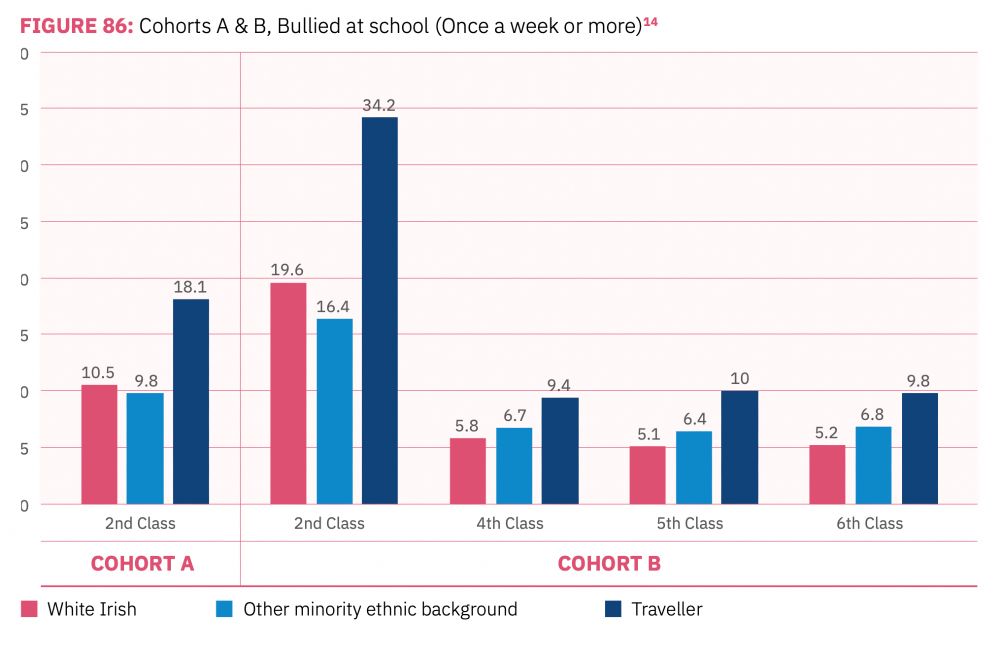
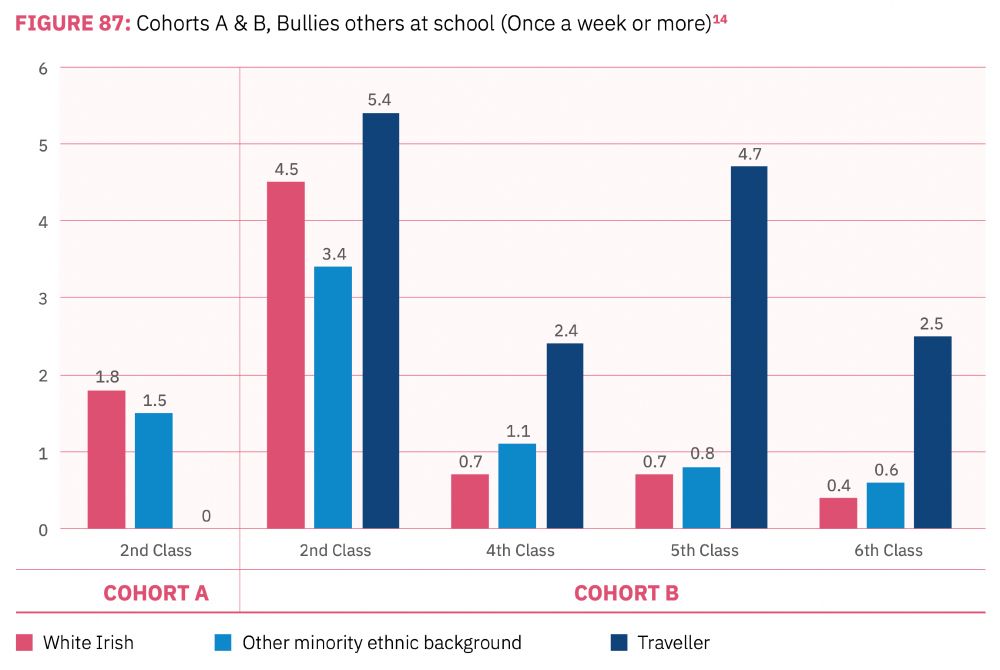
📊 Traveller children report higher levels of being bullied than any other ethnic group across both Cohort A and Cohort B.
With respect to agreeing they bullied others once a week or more, Traveller children are more likely than other groups to agree.
⬇️ 15/19
20.05.2025 09:19 —
👍 1
🔁 0
💬 1
📌 0
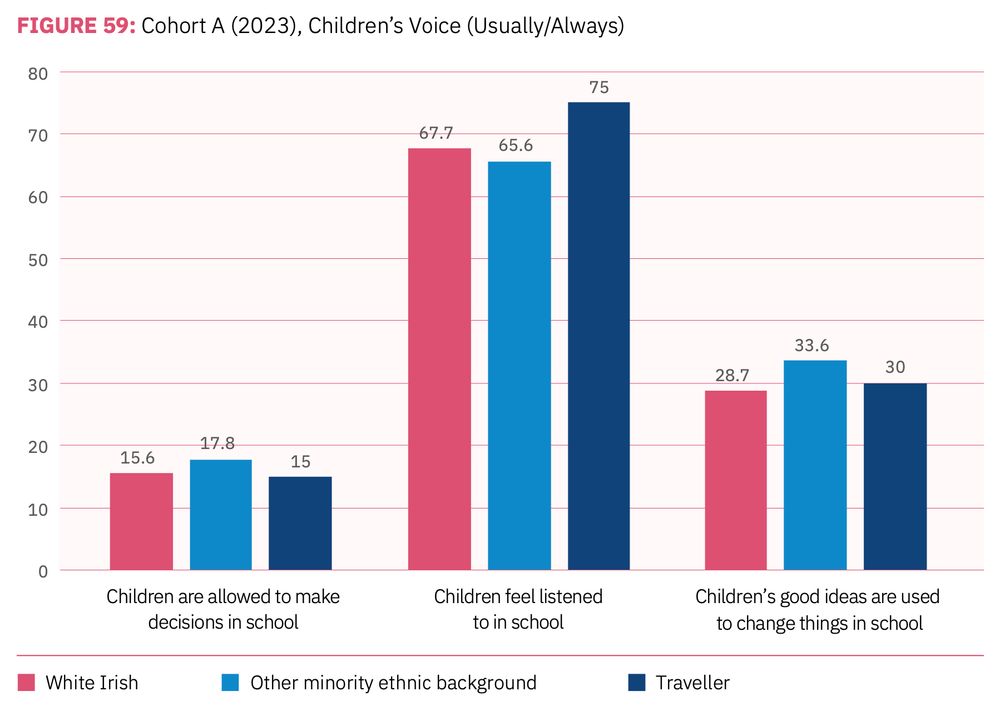
📣 Across both cohorts, there are no differences in the views of Traveller children and their peers of other ethnic backgrounds on having a voice and being listened to in school.
⬇️ 14/19
20.05.2025 09:19 —
👍 1
🔁 0
💬 1
📌 0
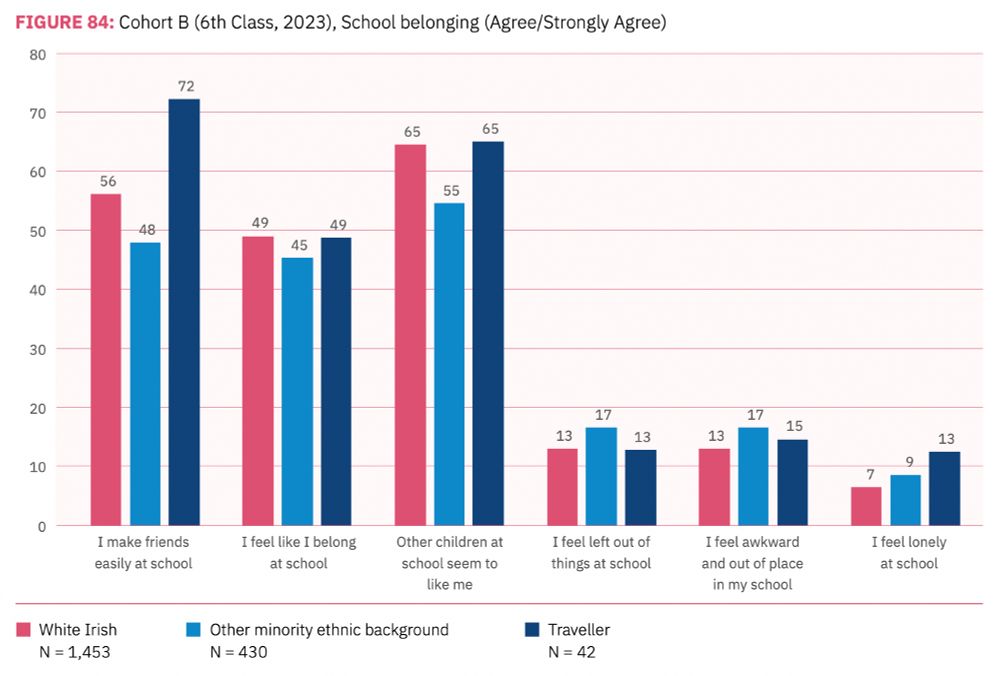
👍 There are no differences in Traveller children’s feelings of friendship, support, and care when compared to their white Irish/majority ethnic peers.
⬇️ 13/19
20.05.2025 09:19 —
👍 1
🔁 0
💬 1
📌 0
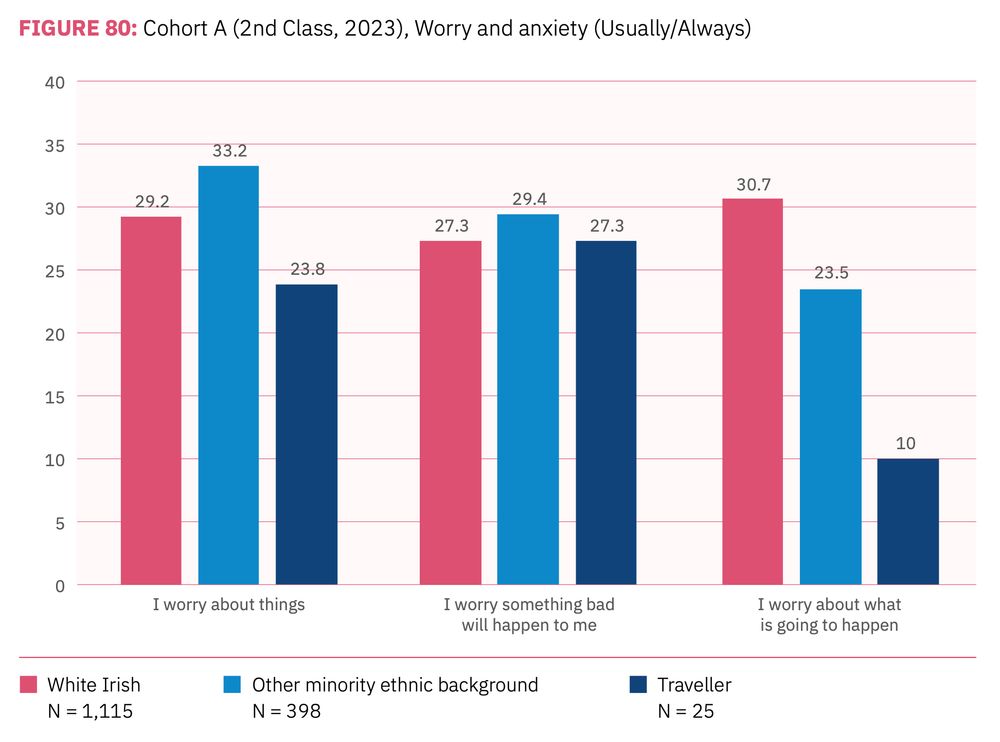
👍 In general, Traveller children report higher levels of wellbeing than their peers.
Traveller children are less likely to feel anxious than their peers of other ethnic backgrounds.
⬇️ 12/19
20.05.2025 09:19 —
👍 1
🔁 0
💬 1
📌 0

📝 Traveller children are more likely than their peers to say that they like it when the teacher works with them on their own.
They are less likely than their peers to say they like working in pairs.
⬇️ 11/19
20.05.2025 09:19 —
👍 1
🔁 0
💬 1
📌 0
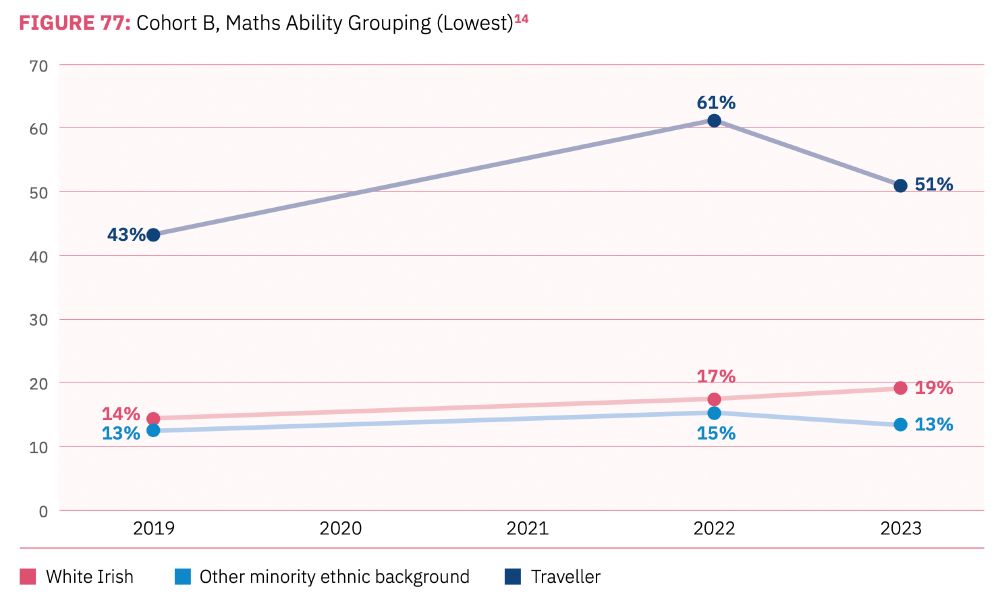
➕ A similar pattern is evident in relation to Traveller children’s mathematics ability group placement.
⬇️ 10/19
20.05.2025 09:19 —
👍 1
🔁 0
💬 1
📌 0
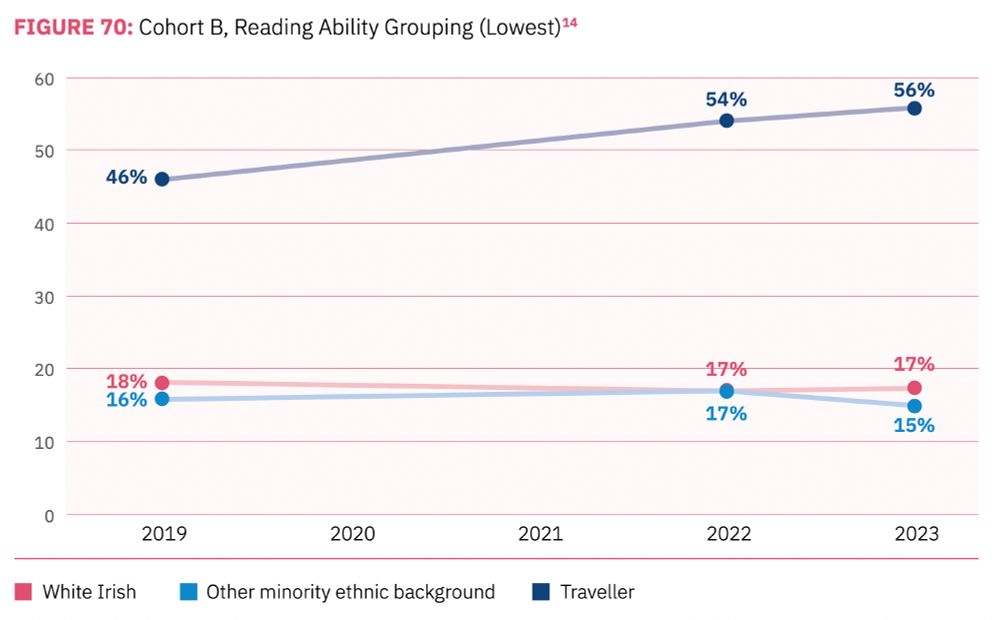
📖 There is no major difference in Traveller children's membership of reading ability groups in the earlier years of primary school.
As Traveller children progress through primary school they are more likely than any other ethnic group to be in the lowest reading ability group.
⬇️ 9/19
20.05.2025 09:19 —
👍 1
🔁 0
💬 1
📌 0
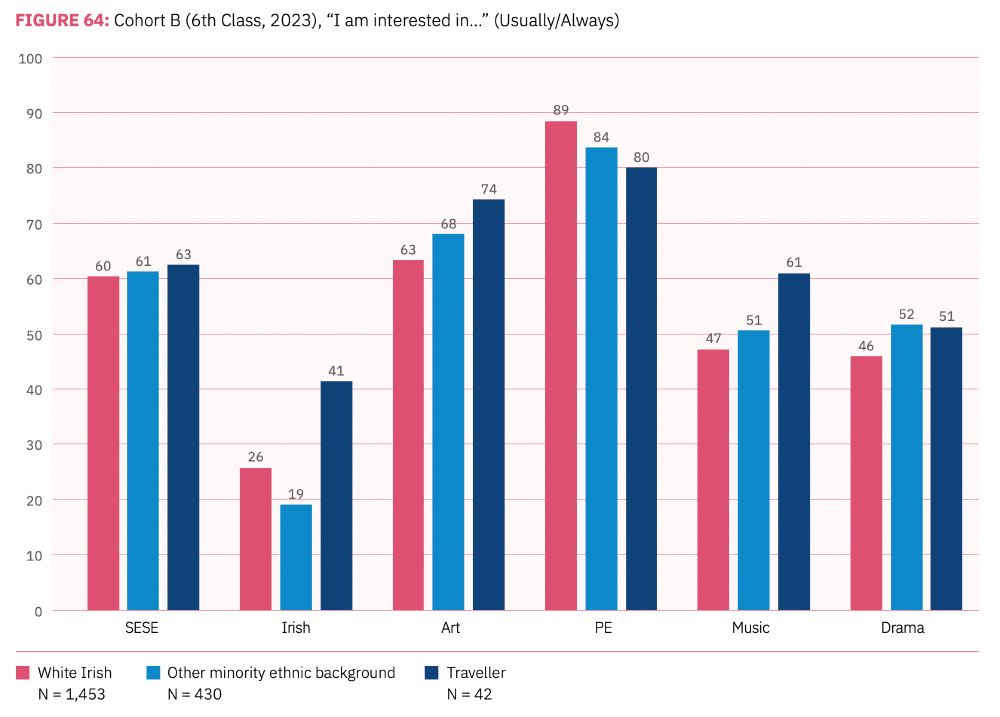
🏀🎨🌍 Traveller children in 6th class are most interested in PE, Art, and SESE.
⬇️ 8/19
20.05.2025 09:19 —
👍 1
🔁 0
💬 1
📌 0























